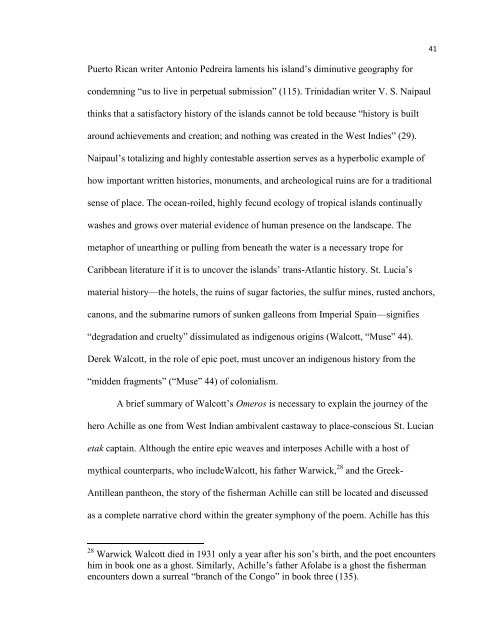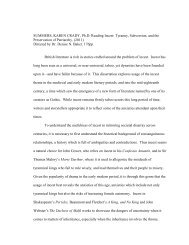RE-INHABITING THE ISLANDS - The University of North Carolina at ...
RE-INHABITING THE ISLANDS - The University of North Carolina at ...
RE-INHABITING THE ISLANDS - The University of North Carolina at ...
Create successful ePaper yourself
Turn your PDF publications into a flip-book with our unique Google optimized e-Paper software.
41<br />
Puerto Rican writer Antonio Pedreira laments his island‘s diminutive geography for<br />
condemning ―us to live in perpetual submission‖ (115). Trinidadian writer V. S. Naipaul<br />
thinks th<strong>at</strong> a s<strong>at</strong>isfactory history <strong>of</strong> the islands cannot be told because ―history is built<br />
around achievements and cre<strong>at</strong>ion; and nothing was cre<strong>at</strong>ed in the West Indies‖ (29).<br />
Naipaul‘s totalizing and highly contestable assertion serves as a hyperbolic example <strong>of</strong><br />
how important written histories, monuments, and archeological ruins are for a traditional<br />
sense <strong>of</strong> place. <strong>The</strong> ocean-roiled, highly fecund ecology <strong>of</strong> tropical islands continually<br />
washes and grows over m<strong>at</strong>erial evidence <strong>of</strong> human presence on the landscape. <strong>The</strong><br />
metaphor <strong>of</strong> unearthing or pulling from bene<strong>at</strong>h the w<strong>at</strong>er is a necessary trope for<br />
Caribbean liter<strong>at</strong>ure if it is to uncover the islands‘ trans-Atlantic history. St. Lucia‘s<br />
m<strong>at</strong>erial history—the hotels, the ruins <strong>of</strong> sugar factories, the sulfur mines, rusted anchors,<br />
canons, and the submarine rumors <strong>of</strong> sunken galleons from Imperial Spain—signifies<br />
―degrad<strong>at</strong>ion and cruelty‖ dissimul<strong>at</strong>ed as indigenous origins (Walcott, ―Muse‖ 44).<br />
Derek Walcott, in the role <strong>of</strong> epic poet, must uncover an indigenous history from the<br />
―midden fragments‖ (―Muse‖ 44) <strong>of</strong> colonialism.<br />
A brief summary <strong>of</strong> Walcott‘s Omeros is necessary to explain the journey <strong>of</strong> the<br />
hero Achille as one from West Indian ambivalent castaway to place-conscious St. Lucian<br />
etak captain. Although the entire epic weaves and interposes Achille with a host <strong>of</strong><br />
mythical counterparts, who includeWalcott, his f<strong>at</strong>her Warwick, 28 and the Greek-<br />
Antillean pantheon, the story <strong>of</strong> the fisherman Achille can still be loc<strong>at</strong>ed and discussed<br />
as a complete narr<strong>at</strong>ive chord within the gre<strong>at</strong>er symphony <strong>of</strong> the poem. Achille has this<br />
28 Warwick Walcott died in 1931 only a year after his son‘s birth, and the poet encounters<br />
him in book one as a ghost. Similarly, Achille‘s f<strong>at</strong>her Afolabe is a ghost the fisherman<br />
encounters down a surreal ―branch <strong>of</strong> the Congo‖ in book three (135).
















